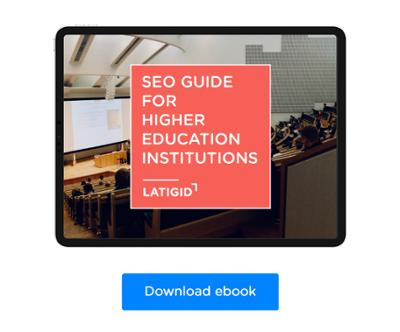
In today's digital world, content is king. This is especially true for higher education institutions, which are competing for the attention of prospective students in an increasingly crowded marketplace. A well-crafted content marketing plan for higher education can help you attract and engage prospective students, build brand awareness, and boost enrollment.
This blog post will walk you through the steps of creating a winning content marketing plan for higher education. We'll cover everything from defining your goals to identifying your target audience to creating high-quality content that will resonate with your ideal students.
Benefits of having a content marketing strategy for higher education
Creating a content marketing strategy for higher education institutions offers a multitude of benefits that can significantly impact their success and visibility. Here are some of the key advantages:
Increases enrollment: A well-structured content marketing plan can help attract and engage prospective students. By showcasing the unique offerings, programs, and campus culture, institutions can pique the interest of potential applicants and boost enrollment numbers.
Improves brand reputation: Consistent, high-quality content can bolster an institution's reputation in the education sector. Sharing thoughtful leadership pieces, success stories, and relevant insights can position the institution as a credible authority in its field.
Improve student retention: Content marketing doesn't end at enrollment. It can also support student success by providing valuable resources, study tips, and career guidance, which can contribute to higher retention rates.
Increases alumni engagement: Engaging content can help maintain strong connections with alumni. Sharing alumni success stories, updates on campus developments, and opportunities for involvement can foster a sense of community and encourage continued support.
More effective communication: A content plan ensures that communication with various stakeholders—students, parents, faculty, staff, and donors—is consistent and targeted. This clarity in messaging can help build trust and keep everyone informed.
Bring SEO benefits: Creating and regularly publishing content can improve an institution's search engine rankings. This means that when people search for educational programs or information, the institution is more likely to appear in search results, increasing visibility.
Increases lead generation: Content marketing can be a potent tool for generating leads. By offering valuable resources like e-books, webinars, or newsletters in exchange for contact information, institutions can build a pool of potential students or donors.
A cost-effective strategy: Compared to traditional advertising methods, content marketing can be cost-effective. It allows institutions to reach a wider audience with a smaller budget, making it an attractive option for institutions with limited marketing resources.
Reaches a global audience: With the power of the internet, educational institutions can use content marketing to reach a global audience. This is especially beneficial for universities and colleges looking to attract international students.
Related article: Content Marketing for Higher Education: Creating High-Fidelity Content
A winning content marketing plan for higher education
Creating a winning content marketing plan for higher education involves a strategic approach that aligns with the institution's goals, target audience, and resources. Here's a step-by-step guide to help you develop an effective plan:
Define your objectives
- Start by identifying clear, measurable goals. Common objectives in higher education include increasing enrollment, improving alumni engagement, enhancing brand reputation, or boosting fundraising efforts.
Understand your audience
- Develop detailed buyer personas for prospective students, alumni, donors, and other stakeholders. Understand their needs, challenges, and preferences to create content that resonates.
Do a content audit
- Assess your existing content assets. Identify what works, what needs improvement, and any content gaps that need to be filled.
Develop a content strategy
- Develop a content strategy that outlines your content goals, messaging, channels, and publishing schedule.
- Determine key content themes or pillars that align with your institution's mission and resonate with your audience.
Create high-quality content
- Create high-quality content that adds value to your audience. This can include blog posts, videos, infographics, webinars, case studies, and more.
- Ensure consistency in voice and messaging across all content.
Optimize your content for search engines (SEO)
- Optimize your content for search engines (SEO) to improve organic visibility. Conduct keyword research and integrate relevant keywords naturally into your content.
Use various distribution channels
- Utilize various distribution channels, including your website, social media, email newsletters, and paid advertising, to reach your target audience.
- Promote your content on relevant online forums, discussion groups, and educational websites.
Develop a strong social media strategy
- Develop a strong social media strategy to engage with your audience. Share content, engage in conversations, and leverage platforms like LinkedIn, Instagram, and Twitter.
- Consider using paid social media advertising to extend your reach.
Use email marketing
- Build and segment your email lists for different audience groups (prospective students, alumni, donors, etc.).
- Send tailored email campaigns with valuable content, event invitations, and updates.
Measure your data
- Use analytics tools to track the performance of your content marketing efforts.
- Monitor metrics such as website traffic, conversion rates, social media engagement, and email open rates.
- Analyze the data to identify what's working and what needs adjustment.
- Involve faculty, staff, and students in the content creation process. Their insights and expertise can add authenticity and diversity to your content.
Develop a crisis communication plan
- Develop a crisis communication plan that outlines how to address negative situations or controversies effectively through your content channels.
Related article: Top Higher Education Digital Marketing Strategies for 2024
Creating a winning content marketing plan for higher education requires dedication, adaptability, and a commitment to delivering valuable content to your target audience. By consistently producing engaging and informative content that aligns with your institution's mission, you can build stronger connections with your audience and achieve your strategic goals.
About LATIGID
We are a higher education marketing agency. We help you grow by increasing website traffic, generating more student leads, and closing those leads into enrollment. With a deep understanding of the latest industry trends and best practices, we are well equipped to help your institution grow.
If you are looking for a higher education marketing agency to partner with, check our page to see what we can do for you!
Download our SEO guide and learn how to build a strategy to optimize your Higher Education Institution's website






